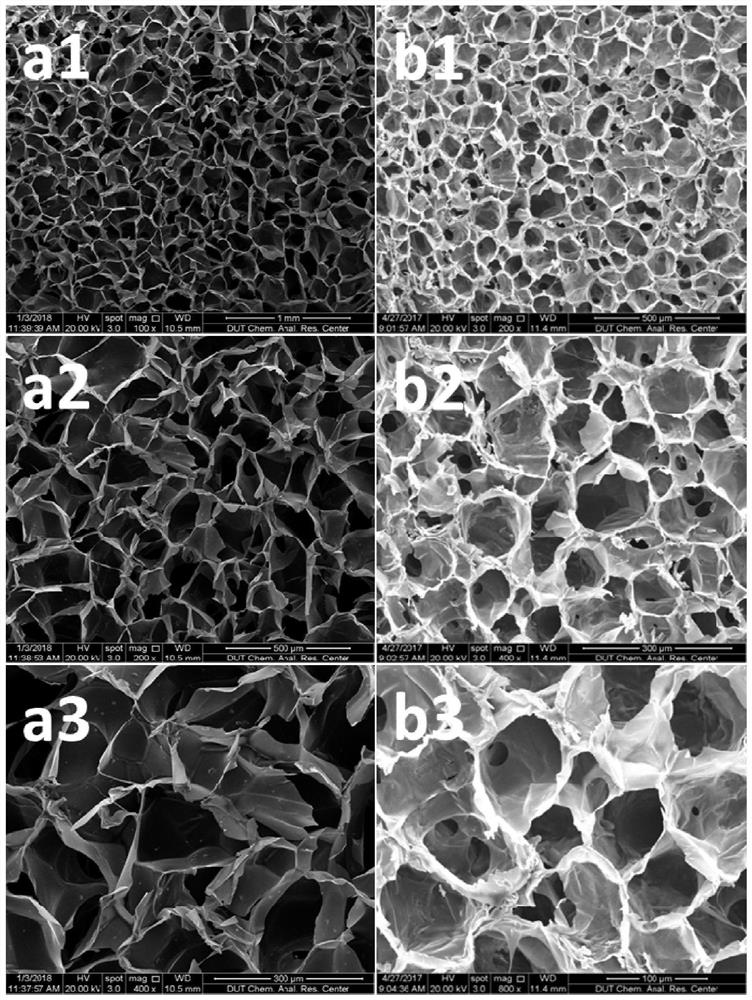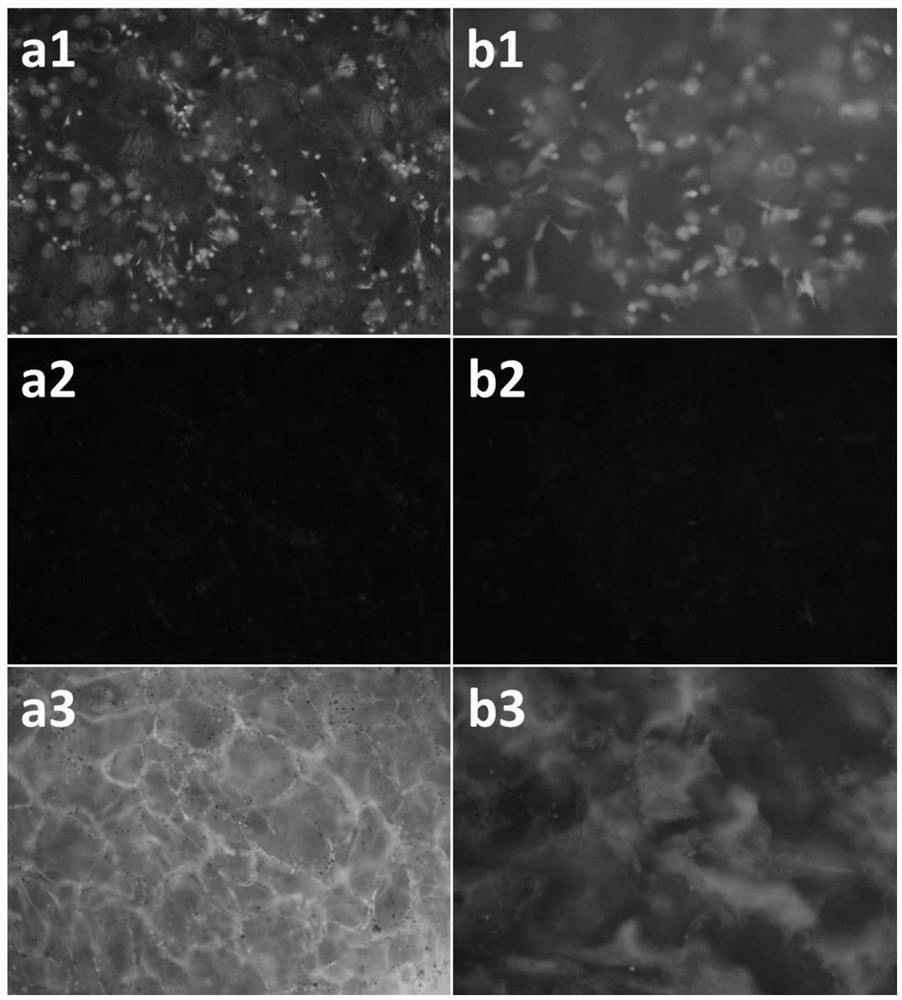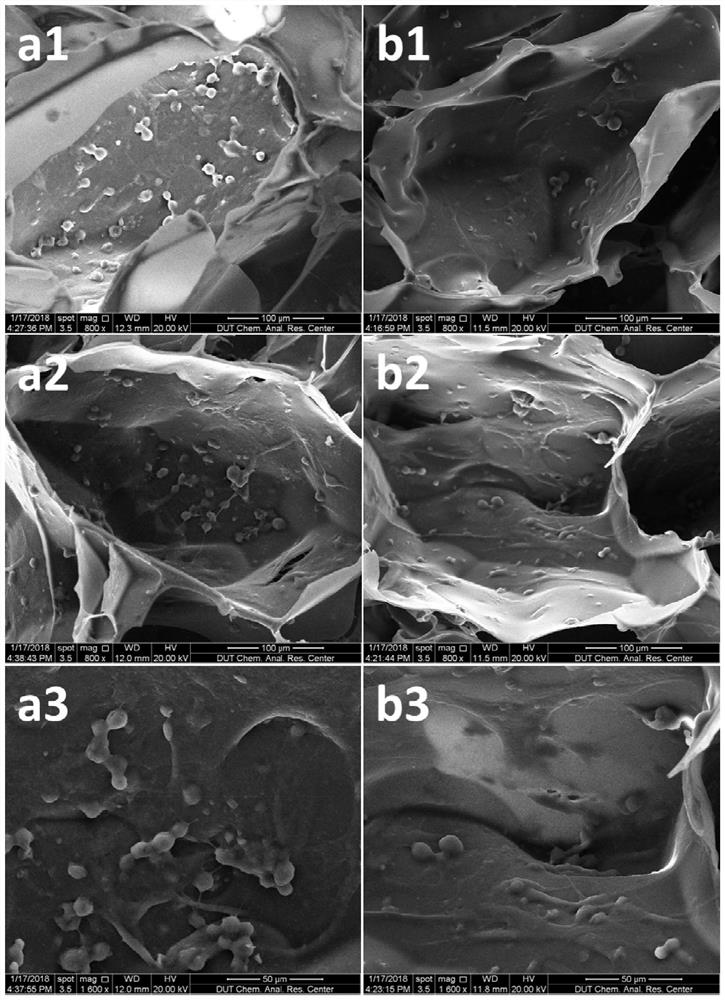A biomimetic composite scaffold material doped with graphene and its construction method
A technology of composite scaffold and construction method, applied in tissue regeneration, prosthesis, medical science, etc.
- Summary
- Abstract
- Description
- Claims
- Application Information
AI Technical Summary
Problems solved by technology
Method used
Image
Examples
Embodiment 1
[0029] Example 1 Preparation of Cs / GP / Gel biomimetic cartilage composite scaffold material (Cs / GP / Gel mass ratio 1:15.2:3.7) (as a comparative example)
[0030] Weigh 2.2 g of chitosan powder, add it into 100 mL of 0.1 mol / L acetic acid solution, and stir it magnetically for 2 h at 40° C. to make it evenly mixed. Centrifuge at 1000rpm for 0.5h to degas and deslag the chitosan acetic acid solution. Weigh 20.0 g of sodium β-glycerophosphate powder, add it into 20 mL of deionized water, and stir magnetically at room temperature for 30 min to dissolve it evenly. Weigh 6.0 g of gelatin particles, add to 100 mL of deionized water, and stir magnetically for 30 min at 40°C to make them evenly mixed. At room temperature, the prepared chitosan acetic acid solution was stirred rapidly on a magnetic stirrer. During the stirring process, the β-sodium glycerophosphate solution was slowly added drop by drop, and the solution was fully stirred for 30 minutes to prepare a Cs / GP solution. Obs...
Embodiment 2
[0031] Example 2 Preparation of Cs / GP / Gel biomimetic cartilage composite scaffold material (Cs / GP / Gel mass ratio 1:6.7:1.6) (as a comparative example)
[0032] Weigh 2.5 g of chitosan powder, add it into 100 mL of 0.1 mol / L acetic acid solution, and stir magnetically for 3 h at 50° C. to make it evenly mixed. Centrifuge at 1000rpm for 0.5h to degas and deslag the chitosan acetic acid solution. Weigh 24.0 g of sodium β-glycerophosphate powder, add it to 16 mL of deionized water, and stir magnetically at room temperature for 40 min to dissolve it evenly. Weigh 7.0 g of gelatin particles, add to 100 mL of deionized water, and stir magnetically for 40 min at 50°C to mix evenly. At room temperature, the prepared chitosan acetic acid solution was stirred rapidly on a magnetic stirrer. During the stirring process, the β-sodium glycerophosphate solution was slowly added drop by drop, and the solution was fully stirred for 30 minutes to prepare a Cs / GP solution. Observe that there is...
Embodiment 3
[0033] Example 3 Preparation of Cs / GP / Gel biomimetic cartilage composite scaffold material (Cs / GP / Gel mass ratio 1:6.7:1.0) (as a comparative example)
[0034] Weigh 3.0 g of chitosan powder, add it into 100 mL of 0.1 mol / L acetic acid solution, and stir it magnetically for 4 hours at 50° C. to make it evenly mixed. Centrifuge at 1000rpm for 1h to degas and deslag the chitosan acetic acid solution. Weigh 30.0 g of sodium β-glycerophosphate powder, add it to 10 mL of deionized water, and stir magnetically at room temperature for 60 min to dissolve it evenly. Weigh 8.0 g of gelatin particles, add to 100 mL of deionized water, and mix evenly with a magnetic stirrer at 60°C for 60 min. At room temperature, the prepared chitosan acetic acid solution was stirred rapidly on a magnetic stirrer. During the stirring process, the β-sodium glycerophosphate solution was slowly added drop by drop, and the solution was fully stirred for 60 minutes to prepare a Cs / GP solution. Observe that ...
PUM
| Property | Measurement | Unit |
|---|---|---|
| pore size | aaaaa | aaaaa |
| elastic modulus | aaaaa | aaaaa |
| elastic modulus | aaaaa | aaaaa |
Abstract
Description
Claims
Application Information
 Login to View More
Login to View More - R&D
- Intellectual Property
- Life Sciences
- Materials
- Tech Scout
- Unparalleled Data Quality
- Higher Quality Content
- 60% Fewer Hallucinations
Browse by: Latest US Patents, China's latest patents, Technical Efficacy Thesaurus, Application Domain, Technology Topic, Popular Technical Reports.
© 2025 PatSnap. All rights reserved.Legal|Privacy policy|Modern Slavery Act Transparency Statement|Sitemap|About US| Contact US: help@patsnap.com



